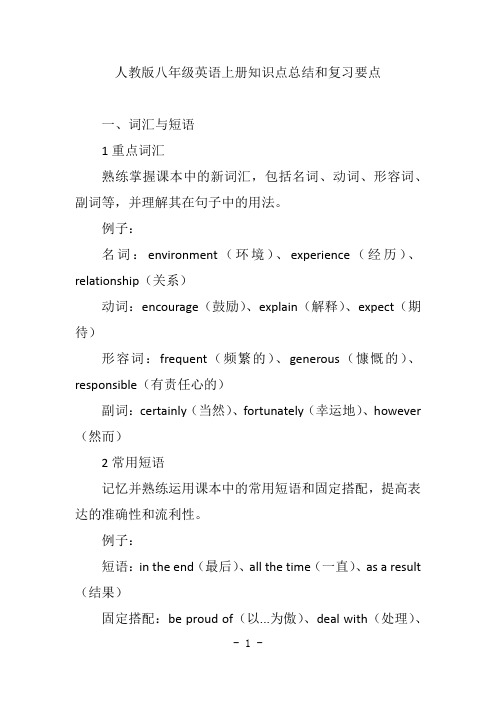八年级英语上册期末复习知识点
译林版初中英语八年级上册期末复习Units5-8单元知识点梳理归纳

译林版初中英语八年级上册期末复习Units5-8单元知识点梳理归纳译林版初中英语八年级上册Unit5 Wild animals知识点梳理【词形变化】1.die vi.死→dead adj.死的→death n.死,死亡2.mean vt.意思是,意味着→meaning n.意思→meaningful adj.有意义的→meaningless adj.无意义的3.born adj.出生的→birth n.出生4.beginning n.开始,起初→begin vt.&vi.开始5.sadly adv.令人遗憾地;伤心地→sad adj.伤心的,难过的→sadness n.伤心,悲伤6.mainly adv.主要地,大部分→main adj.主要的7.danger n.危险→dangerous adj.危险的8.action n.行动;行为→act vt.& vi.行动,表演→active adj.积极的,活跃的→actively adv.积极地,活跃地9.closed adj.关闭的→close vt.&vi.关,关闭→close adj.紧密的,亲密的→closely adv.紧密地10.lost adj.迷路的,迷失的→lose vt.遗失,失去11.hunter n.猎人→hunt vt.& vi.打猎,猎杀12.living n.生存,生计→living adj.活的,现存的→live vi.居住,生活13.illness n.疾病→ill adj.生病的14.slowly adv.缓慢地→slow adj.缓慢的【重点短语】1.live in the wild 生活在野外2.have/take pity on wild animals 同情野生动物3.at four months old 在四个月大时4.weigh over 35 kilograms 重达35公斤多5.for the first time 第一次6.in the beginning 一开始7.learn to look after oneself 学会照顾自己8.live on a special kind of bamboo 以一种特殊的竹子为生9.as a result 因此10.in danger 处境危险11.take action right away 马上采取行动12.build more panda reserves 建造更多的熊猫自然保护区13.make laws to protect pandas 制定法律保护大熊猫14.at birth 出生时,诞生时15.work out easy Maths problems 算出简单的数学问题16.with the help of their mouth and ears 借助于它们的嘴巴和耳朵17.get lost 迷路18.be dangerous to humans 对人类有危险19.lose their lives 丧失他们的生命20.in the daytime 在白天【重点句型】1.So could you please not eat them?(P56)句意:所以请你不要吃掉它们好吗?Could you please…?意为“请你……好吗?”,其中Could不表示过去,只表示比can更有礼貌的请求,属非正式请求,语气较委婉;please 之后要接动词原形,其否定形式是在please之后加not,即Could you please not…?其肯定回答常用Sure./Certainly./of course,I'd love to.其否定回答常用Sorry.…如:一Could you please teach me how to swim? 请你教我如何游泳好吗?一Certainly.当然可以。
八年级上英语期末考试知识点

八年级上英语期末考试知识点本文主要介绍八年级上英语期末考试的知识点,包括词汇、语法、阅读和听力等方面,共分为四个部分。
一、词汇1. 名词常见的名词有人名、地名、国家名称、学科名称等等。
在考试中,可以通过选择题或填空题来测试对名词的掌握。
2. 动词掌握动词的时态和语态是英语学习的一个重要环节。
必须熟练掌握各种时态的用法,如一般现在时、一般过去时、现在进行时、过去进行时等等。
3. 形容词和副词形容词和副词是描述人、事物或感受的词语,要正确运用表示程度或比较级的形容词和副词。
二、语法1. 时态和语态掌握各种时态和语态的用法是英语学习的关键。
要注意在不同情况下选择不同的时态和语态。
2. 介词和冠词介词是修饰名词或代词的重要词汇。
在日常生活中,介词用法很多,要注意掌握各种情况下的使用规则。
冠词则是修饰名词的一种词语,包括定冠词和不定冠词。
3. 主谓一致在考试中,通常会考察主谓一致问题。
考生需要理解主语和谓语之间的关系,正确选择单数或复数形式。
三、阅读阅读理解是英语学习的核心部分之一,主要考察考生对短文和文章的理解能力。
考题形式包括选择、填空和简答等题型,要求考生仔细研读题目,理解文章的含义和主旨。
四、听力听力是英语能力的重要组成部分,也是考试中常见的一种题型。
考生需要通过听力材料听懂其含义,正确回答听力题目。
结语以上是八年级上英语期末考试的主要知识点,希望大家复习的时候能够认真对待,加强对英语基础知识的掌握和运用,达到更好的考试成绩。
人教版八年级英语上册知识点总结和复习要点

人教版八年级英语上册知识点总结和复习要点一、词汇与短语1重点词汇熟练掌握课本中的新词汇,包括名词、动词、形容词、副词等,并理解其在句子中的用法。
例子:名词:environment(环境)、experience(经历)、relationship(关系)动词:encourage(鼓励)、explain(解释)、expect(期待)形容词:frequent(频繁的)、generous(慷慨的)、responsible(有责任心的)副词:certainly(当然)、fortunately(幸运地)、however (然而)2常用短语记忆并熟练运用课本中的常用短语和固定搭配,提高表达的准确性和流利性。
例子:短语:in the end(最后)、all the time(一直)、as a result (结果)固定搭配:be proud of(以...为傲)、deal with(处理)、pay attention to(注意)二、句型与语法1基本句型熟练掌握五种基本句型,包括主语+谓语、主语+谓语+宾语、主语+谓语+间接宾语+直接宾语、主语+谓语+宾语+宾语补足语、主语+系动词+表语。
例子:主语+谓语:She sings.(她唱歌。
)主语+谓语+宾语:I like apples.(我喜欢苹果。
)主语+谓语+间接宾语+直接宾语:He gave me a book.(他给了我一本书。
)主语+谓语+宾语+宾语补足语:I found the book interesting.(我发现这本书很有趣。
)主语+系动词+表语:She is beautiful.(她很漂亮。
)2时态深入学习并掌握现在完成时、过去进行时、一般将来时、过去将来时等时态的用法和形式。
例子:现在完成时:I have already seen that movie.(我已经看过那部电影了。
)过去进行时:They were playing football when I called them.(我打电话给他们时,他们正在踢足球。
期末总复习Unit2基础知识篇 鲁教版英语八年级上册

鲁教版初中英语八年级上册期末基础知识复习Unit 1——Unit 4Parti各单元重点短语Unit 2 Why don't you talk to your parents?Section AI .talk to/with sb.和某人交谈2.too much homework 太多的家庭作业3.too many aftcr-school classes 太多的课外辅导课4.get enough sleep得到足够的睡眠5.have free time to do sth.有空闲时间做某事6.allow sb. to do sth.允许某人做某小7.hang out with sb,与某人闲逛8.get into a fight with sb. = fight with sb. =havc a fight with sb.和某人打架/吵架9.go to sleep睡着;睡觉10.write sb. a letter = write a letter to sb, 给某人写信I l.call sb. /call叩sb.给某人打电话12.sothat+句子(引导目的状语从句)以便;为了13.surprise sb. = make sb. surprised 使某人吃惊14.be good at (doing) sth.擅长(做)某事15.talk about... (about是介词)讨论...16.on the phone打电话;在电话中17.look through...快速杳看;浏览18.give sth. back to sb. = return sth. to sb.把某物还给某人19.be angry with sb.生某人的气20.big deal重要的事Section B1.play sports 做运动2.play computer games 玩电脑游戏3.spend time alone 独自打发时间4.give sb. a lot of pressure (pressure为不可数名词)给某人施加很大压力5.have enough free time有足够的休闲时间6.have a fight with sb.和某人打架/吵架pctc with••-和.... 竞争/对抗8.be unhappy with sb,与某人不开心,对某人不满意9.frcc time activities 业余活动10.help each other 相互帮助pete with sb.与某人竞争12.have after-school lessons 上课外辅导班13.on weekends = on the weekend 在周末14.so many/much 那么多15.take so many after-school classes 上那么多课外辅导课16.1eam exam skills学习应试技巧21.work out成功地发展;解决22.get on/along with...与..... 和睦相处/关系良好23.hang over (不愉快的事)逼近;威胁着24.elder brother 哥哥25.be nice to sb,对某人好26.refuse to do sth,拒绝做某事27.at night 在晚上28.feel lonely and nervous 感到孤独和紧张29.offer to do sth.主动提出做某事municatc with...和...... 交流/沟通31 .mind sb. doing sth.介意某人做某事32.all the time —直;频繁33.make sth. clear 把.... 弄清楚34.make sb. Angry 惹某人生气35.be worried about/wony about... 担心.....36.copy ones homework 抄某人的作业37.borrow one's things without returning them 借另U人的东西不还38.leavc sth. at home 把某物落在家里39.be afraid of doing sth.害怕做某事40.in front就...在.....前面41 .not…any more = no more 不再17.take sb. to piano lessons 带某人上钢琴课18.cut out删除;删去19.be important for one's future 对某人的未来是重要的20.want sb. to be successful 想让某人成功21.not…until… 直到.... 才22.have a quick dinner 匆忙吃过晚饭23. a mother of three (children)—位三个孩子的母亲24.send・・・ to…把送到 ...25.all kinds of,*, 各种各样的....pare,•, with… 把 ... 与... 作比较/对比27.push sb. too hard 把某人逼得太紧28.be good for one\ development 对某人的发展有好处29.keep on happening 持续发生30.physical exercise 体能锻炼31 .practice of skills 技能练习32.be the first to do sth.第一个做某事的人33.look for differences and similarities between things 37.keep trying to do sth,不停地努力做某事在事物中寻找相同点和不同点38.helpsb. (to) relax有助于某人放松34.agree with sb.同意某人的想法39.turn down the TV 调低电视音量35.from a young age 从很小开始40.do something quiet做一些安静的事情36.in one's opinion 依..... 看Part II重点句子Section A1.1have to study too much so I don't get enough sleep.(教材P9)我不得不学习很多东西,因此我得不到足够的睡眠。
八年级上册英语必考点

八年级上册英语必考点
以下是八年级上册英语必考点:
1.时态:包括一般现在时、一般过去时、一般将来时以及现在进
行时等。
2.数词:包括基数词和序数词的用法。
3.代词:包括人称代词、物主代词、反身代词和指示代词的用法。
4.名词:包括可数名词和不可数名词的用法,以及单数形式和复
数形式的转换。
5.动词:包括及物动词和不及物动词的用法,以及动词的时态和
语态的转换。
6.形容词和副词:包括形容词和副词的比较级和最高级的用法。
7.冠词:包括定冠词和不定冠词的用法。
8.介词:包括表示时间、地点、方向和方式等的常用介词的用法。
9.疑问句和陈述句的转换:包括疑问词的使用和疑问句的构成。
10.宾语从句和定语从句:包括宾语从句和定语从句的引导词和构成。
11.情态动词:包括can、could、may、might、must、shall、should、will、would、have to和need的用法。
12.倒装句:包括将助动词、情态动词或系动词放在主语之前的构成和使用。
13.同义词和反义词:包括常见的同义词和反义词的词汇搭配和用法。
以上是八年级上册英语必考点的一些内容,具体还需根据教材内容和学校要求进行复习。
人教版八年级英语上册unit 10基础知识点期末复习及训练(含答案)

Unit10基础知识点期末复习及训练(含答案)Unit 10 If you go to the party, you will have a great time 基础知识点复习一、重点短语复习1.stay at home待在家里2.take the bus乘公共汽车3.tomorrow night明天晚上4.have a class party进行班级聚会5.half the class一半的同学6.make some food做些食物7.order food订购食物 8.have a class meeting开班会9.at the party在聚会上 10.potato chips炸土豆片,炸薯条11.in the end最后 12.make mistakes犯错误13.go to the party去参加聚会 14.have a great/good 玩得开心15.give sb. some 16.advice给某人提一些建议17.go to college上大学 18.make(a lot of)money赚(许多)钱19.travel around the world环游世20. careless adj. 粗心的;反义词:careful,意为“小心的”。
21. advise doing sth. 建议做某事;advise sb.(not)to do sth. 建议某人(不)做某事22. run away from“从…逃离” “逃避”23. cut …in half “切成两半”24.tell sb. to do sth. 告诉某人做某事25.too…to d o sth. 太……而不能做某事26.be afraid to do sth. 害怕做某事 27.need to do sth. 需要做某事二、重点句型1. It’s best (not) to do sth.最好(不)做某事2.give sb. some advice给某人提一些建议3.tell sb. to do sth. 告诉某人做某事4. have a great time 意为“玩得愉快”,=enjoy oneself, = have fun, =have a good / wonderful / nice time5.have a great / good time in (doing) sth. 做某事很开心6.be afraid +that从句例:I’m afraid that I can’t finish on time7. It’s best (not) to do sth.最好(不)做某事例:It’s best to speak English every day.三、易错知识点辨析1. be afraid to do sth. 害怕干某事例句1、I’m afraid to speak in front of other people.be afraid of sth. 害怕某事例句2、He told me not to be afraid of difficulties.be afraid +that从句例句3、I’m afraid that I can’t finish on time2. advise v.“劝告;建议”n. advice,是不可数名词.例句1、Give me some advice!advise doing sth. 建议做某事。
(人教版新目标)八年级英语上册全册各单元知识点期末总复习讲解教学课件

3. feel like “感受到;摸起来”,后跟宾语 从句或名词。 I felt like I was a bird. 我感觉我是一只鸟。 It feels like a stone. 它摸起来像一块石头。
eg.something special; somewhere wonderful. 2.不定代词做主语时,谓语动词用第三人称单数。 eg.Is everybody here? 大家都到齐了吗?
1. get to/reach/arrive 都是“到达“的意思。
get to+sp=reach+sp = arrive at+sp(小)=arrive in+sp(大) 若他们后面要加地点副词here, there, home等,则 不需要加介词。
25、up and down上上下下 26、come up出来 27、enjoy oneself=have fun=have a good time
玩的开心
二、重要句子(语法):
1.Where did you go on vacation? 你到哪里去度假了?
I went to New York City. 我去了纽约城。
三、习惯用法、搭配
1. buy sth. for ab./ buy sb. sth. 为某人买某物 2. taste + adj. 尝起来…… 3. nothing to do but do除了……之外无事可干 4. seem + (to be) + adj 看起来 5. arrive in + 大地方 / arrive at + 小地方 到达某地 6. decide to do sth=make a decision决定做某事 7. try doing sth. 尝试做某事
八年级上册英语知识点总结归纳

八年级上册英语知识点总结归纳一、基本语法知识1. 时态:一般现在时、一般过去时、现在进行时、过去进行时、一般将来时、过去将来时等。
2. 动词的用法:及物动词和不及物动词的区别,动词的时态和人称变化。
3. 名词的用法:可数名词和不可数名词的区别,名词的复数形式。
4. 形容词和副词的用法:形容词和副词的比较级和最高级形式。
5. 代词的用法:人称代词、物主代词、指示代词等。
6. 介词的用法:介词短语的构成和用法。
7. 定冠词和不定冠词的用法:a, an, the的区别和用法。
二、词汇知识1. 常见的动词、名词、形容词和副词的用法。
2. 数词:基数词和序数词的用法。
3. 介词短语中常见的介词和短语的用法。
4. 连词:and, but, or等的用法。
5. 感叹词:how, what等的用法。
三、句型知识1. 肯定句、否定句和疑问句的基本用法。
2. There be 句型的用法。
3. 情态动词的用法:can, could, may, might, must等。
4. 复合句的构成和用法。
5. 定语从句的引导词和用法。
四、交际用语1. 问候和介绍自己。
2. 提出请求和建议。
3. 表示喜欢和不喜欢。
4. 打电话和约会。
五、阅读技巧1. 掌握不同类型文章的阅读技巧,如记叙文、说明文、议论文等。
2. 学会根据上下文推测词义。
3. 注意文章中的重点句子和关键信息。
六、写作技巧1. 学会使用适当的时态和语法结构。
2. 注意语言表达的准确性。
3. 练习写日记、信件、短文等不同类型的作文。
- 1、下载文档前请自行甄别文档内容的完整性,平台不提供额外的编辑、内容补充、找答案等附加服务。
- 2、"仅部分预览"的文档,不可在线预览部分如存在完整性等问题,可反馈申请退款(可完整预览的文档不适用该条件!)。
- 3、如文档侵犯您的权益,请联系客服反馈,我们会尽快为您处理(人工客服工作时间:9:00-18:30)。
新目标英语八年级(上)期末复习一、非谓语动词1、动词+不定式1)want\would like\ask\tell\forbid (sb.) to do sth. (注:ask\tell sb. not to do sth. 叫某人不干某事 )2)plan\hope\decide to do sth. 计划、希望、决定去干某事2、动词+v-ing1)enjoy\finish\practise doing sth. 喜欢、完成、练习干某事2)spend + 时间、金钱(in) doing sth. 花费时间、金钱干某事3)have fun doing sth. 干某事很愉快have problems doing sth. 干某事有困难3、动词+不定式或 v-ing1)stop to do sth. 停下来,要去干某事stop doing sth. 停止正在干的事2)forget\remember to do sth. 忘记、记住要去干某事Forget\remember doing sth. 忘记、记得已干的事3)like\love\hate to do sth.喜欢、讨厌去干某事like\love\hate to doing sth 喜欢、讨厌干某事(习惯性的)4)start\begin to do或doing sth. 开始干某事(两种表达意义区别不大)4、make\let\help sb. do sth. 使、让、帮助某人干某事5、see\watch \ hear sb. do sth.看见、听见某人干某事(一般包含某事全过程)See\ watch \hear sb. doing sth.看见、听见某人正在干某事6、It takes\took sb.+时间、金钱to do sth.某人花费时间、金钱去干某事=sb. spend 时间、金钱(in) doing on sth.二、形容词与副词1、形容词+ly ---副词如:quick----quickly heavy----heavily1)形容词修饰名词、代词等,修饰不定代词时,放在不定代词之后。
如:Something different不同的东西 somewhere quiet and beautiful安静又美丽的地方2)副词修饰动词、形容词、副词等,修饰动词时,一般放在动词或动词短语之后。
如:rain heavily雨下得大3)look看起来sound听起来smell闻起来taste尝起来等系动词之后常用形容词如:You don’t look well today.你今天看起来脸色不好。
That sounds interesting.听起来很有趣。
(注意:look\sound like +名词如:That sounds like a good idea.)2、形容词与副词的比较级:1)两者间的比较,表示比、更、较。
a. It’s easier to say than to do .说比做容易。
b. Which is bigger,the sun or moon?太阳和月亮,哪个更大?c. Lucy is taller of the two.露西是两者中较高的。
2)比较级前常见的修饰词:much\even\any\far\a little\a bit\a lot等表示程度的副词。
如:It’s a little colder than yesterday.今天比昨天冷一点。
形容词比较级前可以加表示数量的词。
如:My brother is five years older than me.我哥哥比我大五岁。
3)比较级的特殊用法:a. 越来越……:①单音节er+and+单音节er(即比较级+and+比较级)如:Our country is becoming stronger and stronger.我们的国家越来越强大。
②more and more+多音节形容词、副词如:English is becoming more and more popular.英语越来越普遍了。
b.越…,就越…the+比较级,,the+比较级,如:The more careful you are,the fewer mistakes you will make.你越仔细,你犯的错误就越少注意:比较的对象要一致如:Your bag is heavier than Lily.(×)Your bag is heavier thanLily’s.(√)3、形容词、副词最高级:1)三者或三者以上的比较,表示“最”,句中常有表示范围的介词短语of the three\us 或in our class\family等。
注意,形容词最高级前要加the.2)最高级特殊用法①序数词后+最高级,表示“第几,(长、大、远)”The Yellow River is the second longest river in China.黄河是中国第二长河。
②one of+形容词最高级+可数名词复数。
“最,的,之一”Chongqing is one of the biggest cit ies in China.重庆是中国最大的城市之一。
③某人的+形容词最高级,表示“某人的最,”如:Linda is my sister’s best friend.琳达是我妹妹最好的朋友。
3)特殊句型:最好干某事:①It’s best to do sth.②You’d better do sth.如:It’s best to go home now.现在最好回家。
You’d better do your homework first.你最好先做作业。
三、宾语从句宾语从句在复合句中做主句的宾语,常放在know/say/think/ask等之后,通常由下面一些词引导。
1)由that引导,that通常省略.如:I don’t think (that) differences are important in a friendsh.Some reader said (that) they are going to eat more vevetables.2)由连接代词或副词(what/when/where/who等)引导。
(从句部分要用陈述语序)如:Thomas wants to know where Nina lives.It is interesting to hear what the class think about action movies.3)由连词if/whether引导,意为“是否”.She ask me if she could borrow these books.她问我能是否能借这些书。
宾语从句的事态一般与主句一致,但若从句讲的是客观事实,则保持用一般现在时。
如:The teacher told us that the moon goes around the earth.老师告诉我们月亮绕着地球转。
(虽然主句用的是一般过去时,但“月亮绕着地球转”是客观事实,所以用goes,一般现在时)四、状语从句1)when引导的时间状语从句,表示“当,时”Mozart started to write music when he was four yeas old. (主句用一般过去时,从句用一般过去时。
)2)if引导的条件状语从句,表示“如果,”If it rains tomorrow,we won’t go hiking. (主句用一般将来时,从句用一般现在时。
won’t=will not)3)until引导的时间状语从句,主句一般用否定。
(not①事until②事直到②事才①事)如:I didn’t go to bed until mother came back.我直到妈妈回来才睡觉。
八年级英语上册期末复习资料一、易混词组1.health健康(名), healthy健康的(形), healthily健康地(副)Drinking milk is good for our health.A healthy lifestyle can help us keep healthy.I am going to eat healthily this year.2.may,(情动)maybe(副),may be(谓动)可能He may know the answer. = Maybe he knows the answer.He may be at home. = Maybe he is at home.3.be good for 对,有利,be good at 擅长于,be good with 与某人相处好,be good to 对某人友好4.think(认为) /hear (听说) /because(因为)+从句think of /hear of / because of+名词5.forget/remember to do sth忘记/记着去做某事forget/remember doing sth忘记/记着做了某事6.stop to do sth 停下来去做某事stop doing sth停止做某事7.take, spend, pay, cost花费例:我买这件外套花了100元钱.It took me 100 yuan to buy this coat.(it作主语)I spent 100 yuan on this coat/(in)buying this coat.(人作主语)I paid 100 yuan for this coat.(人作主语This coat cost me 100 yuan.(物体作主语)8.Sometime(将来的)某时, some time一段时间, sometimes有时, some times几次9.few(几乎没有), a few(一些)+复数名词little(几乎没有), a little(一点儿)+不可数名词10.a (large) number of(许多) a small number of(少量的), the number of …的数量A number of students are in the classroom.许多学生都在教室里.The number of the students in the classroom is 30. 教室里学生的数量是30.11.both(…and)(两者)都all (多者)都the other(两者中的),另一个another(多者中的)另一个between(…and) (两者)之间among (多者)之间neither(两者)都不none(多者)都不12.赢: win+比赛/奖beat+某人/某团体13.参加:join+某人/组织take part in+活动14.in the south of, to the south of, on the south of 在,的南方Hainan is in the south of China.(海南在中国范围之内)Hainan is to the south on Hubei.(海南在湖北范围之外,且不接壤)Hunan is on the south of Hebei.(湖南在湖北范围之外, 但接壤)15.太多: too much+不可数名词, too many+复数名词; 太: much too+形容词或副词16.too, also, either, so 也I like English, too. =I also like English.I don't like English, either.You like English, so do I.(你喜欢英语,我也喜欢.)17.so, such 如此She is so clever that everyone likes her. = She is such a clever girl that everyone likes her. 她如此聪明,每个人都喜欢她.二、重点词组句型1.better and better越来越好,more and more beautiful 越来越美丽2.10 minutes' walk= ten-minute walk=10 minutes on foot 十分钟步行的路程(表示路程,用来回答how far)3.ss +原级as像…一样,not as/so +原级as 不如He is as tall as you.He is not as/so tall as you.= He is shorter than you.=You are taller than him.4.somewhere interesting有趣的地方something important 重要的事情somebody else 别的人5.enough food足够的食物(enough+名词),big enough足够大(形/副+enough)6.one of the most useful animals最有用的动物之一(one of+最高级+复数)7.I didn't go to bed until my father came back last night. 昨晚直到我爸回来我才去睡觉.8.I'm sorry to hear that. 听到这我很难过.9.too+形/副原级to do 太…而不能,so+形/副原级+that+从句如此…以致不能not+形/副原级enough to do 不足够…去做My daughter is too young to go to school. = My daughter is so young that she can't go to school.= My daughter is not old enough to go to school.10.I was the first (student) to get to school yesterday. 我昨天是第一个到校的(学生).11.It's easy to have a healthy lifestyle.= To have a healthy lifestyle is easy. = Having a healthy lifestyle is easy. 拥有健康的生活方式很容易. (动词作主语的三种表达方式)I found it easy to have a healthy lifestyle.我发现拥有健康的生活方式很容易.(动词作宾语,需要it作形式宾语)12.Yellow River is the second longest river in China. 黄河是中国的第二长河.(序数词+最高级+名词)13.finish doing 做完某事enjoy doing 喜欢做某事practice doing练习做某事keep doing 一直做某事14.make sb do sth使某人做某事let sb do sth让某人做某事15.My sister is the funniest person I know.我姐姐是我认识的人中最风趣的人.(I know为定语从名修饰person)16.I'm going to do what I want to do.我将做我想做的事.(what I want to do为宾语从句,用陈述句语序)17.This is what we learned.这就是我们所得知的.(what we learned 为名词性从句,用陈述句语序)18.I'm going to stay at home if it's rainy tomorrow.如果明天下雨,我就呆在家里.(if表示如果;主句用将来时, if从句只用一般现在时)19.The more friends I have, the happier I will be. 我的朋友越多,我就越快乐.。
